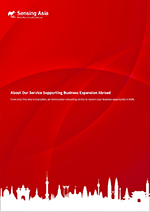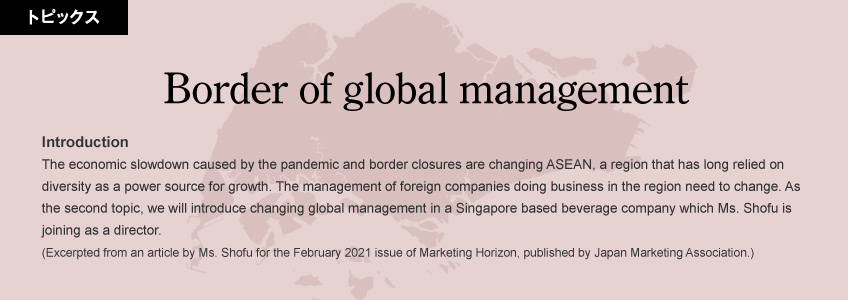With the pandemic showing no signs of slowing down, this year would be a real test of our ability to adapt. For multinational beverage company Pokka Pte Ltd, headquartered in Singapore, from where it manages several subsidiaries in Malaysia, a licensed production facility in Indonesia, and exports to countries around the world except Japan.
Although the demand for business in Singapore has been increasing since July 2020, after the lockdown lifted, its operations have not been able to keep up with shortage of Malaysian and Chinese workforce due to the border closures, which is a real headache. Specifically, there is a significant shortage of manpower for factory and warehouse operations, logistics, etc., as Singaporean do not want to take these types of job.
The Singapore government advocates "Let's cover the labor shortage with technology, let's bring more automation to the workplace," and is promoting the talent development in the technological and digital fields. However, the reality is that there is a gap between this ideal and speed of talent development or the speed of realization of business transformation in response to the current shortage of human resources.
On the other hand, the expansion of Covid 19 in Malaysia is worsening, and its second lockdown kicked in in mid-January, the already-troubled-market further dampened before Chinese New Year. Despite of the company's efforts to prevent the spread of the Covid 19, there seems no way to prevent cases of infection in the homes of employees or in the local community, and the mood at each of the company remains tense.
The pandemic has given us a new sense of business direction: the importance of business diversification among mid-sized and large companies. This applies to all countries, businesses, and locations where they do business, except for companies that focus on digital platforms.
For example, looking at the country portfolio of major ASEAN countries, Indonesia, Malaysia, and Thailand have experienced multiple lockdowns and have been considerably impacted by the pandemic. Vietnam and Singapore, on the other hand, have already entered the recovery phase. If you are doing business only in one country, you will be directly affected by the macroeconomic conditions in that country.
The business portfolio is also under the review. This pandemic, which required avoiding human movement and contact, made us be enlightened the fact that whether the business is essential or non-essential. Those that were not considered as social infrastructure or essential/essential services were forced to scale back operations during the lockdown. The tide also turned depending on the degree to which the business was able to bring its operations online.
Pokka is a beverage business, so it is perceived as an essential business, but even so, during the initial lockdown in Malaysia, operations had to be halted for nearly 10 days in order to obtain approval for factory operation and distribution.
Furthermore, the supply chain disruption. The risks of focusing on a particular base or supplier in pursuit of efficiency were brought to light again. In addition, transportation costs related to the movement of goods have continued to rise, making it extremely difficult to find space for shipping cargo. Or even finding the space, we have to accept triple fold ocean freight.
Management that connects the dots
From its outset, ASEAN has been aiming to develop as one big economic zone. In order to achieve this, there were regional initiatives to increase the mobility of people and goods, such as the AEC (ASEAN Economic Community), but now the borders are closed and there is no mobility of people at all.
This is why it is important to hedge business with a different view to "region”. Which is a way of thinking that business is connected as a collection of “dots”, not the “area” in which mobility of people are as smooth as we had before.
Corporation management within ASEAN is not uniform, as it is subject to the legal systems and regulations of each country. Different races, religions, and cultures, as well as different stages of economic development, mean that the relationship between employees and companies is also diverse. Until now, operational travel within ASEAN has been just a day trip, similar to the domestic business trips in Japan, allowing for frequent face-to-face communication. In addition, if something happened, it was easy to fly to the neighbouring country, and this convenience of connectivity has helped to bridge the gap between different views and attitudes.
The power of empathy to connect
In order to connect the dots between countries, so we can operate the business as a group in an environment where mobility is not free, and we also know this situation is likely to continue for some time, empathy for each location and its employees has never been more imperative. Empathy is said to be the ability to understand the needs of others. Even if a group has one management policy, one brand, the companies in each country where it operates have different employee attitudes as well as different environments which are changing every moment. Many employees have not been able to see their families for a long time due to the border closures, which is mentally stressful for them.
Are platforms such as Zoom or Teams helping? Yes, they are helpful in terms of operations and understanding the situation. However, I still feel that they are not enough to deepen psychological engagement with employees of different nationalities and living conditions, so I am trying to make up for it through via phone calls and WhatsApp in as much timely manner as possible. Since a basic understanding of the situation in each country is minimum requirement for dialogue, I am making a conscious effort to deepen our conversations by catching up with the ever-changing situation in each country on a daily basis, and by paying close attention to market information, living condition or the intermittent flow of PCR test-positive case and measures taken.
From the power of empathy to the power of trust
In addition, this is a time when fundamental strategy need to change/adapt, as well as new investment decisions must be made. For global management in a situation where it is impossible to practice "actual place", "actual thing" and "actual situation", the ability to "respect and trust the judgment of the people on the ground (in each country)" is more important than proposed plans and figures. On the other hand, increasing tough managerial judgement we need to make, such as intensifying scrap and build or restructuring for the entire group companies, made me believe unless empathy building, we can’t even exercise accountability.
At the same time, the empathy and trustworthiness by the Japanese headquarters will also be tested. As the business environment becomes challenging and uncertain, the Japanese companies, which are reluctant to take risks in the first place, tend to become more risk averse, trapped in Japan's unique point of views and standards of judgment. Therefore, I have felt the frustration of being unable to take actions since last year. Some ASEAN countries are still under serious circumstances but as a whole, they have a positive sense of the future and are resilient in that way nevertheless. To manage these countries, I strongly suggest that the management team at Japan head quater needs to be diversified.
Our Services
Rapidly providing most essential information for initial stage in business extension abroad, including local environment, business information, market information for individual industry. Industry information of the considered countries can be found here without spending hours and the need to contact multiple sources.

Contains reports on latest changes in indications and market trends from local news and articles in native languages. Additionally, approximately ten topics are picked up from hottest local articles and news within last six months for every category listed below.

In this advanced type service, we provide information needed at the detailed investigation stage for market entry, and conduct research on local information of relevant industries, candidates for joint enterprises or business partners, and industrial structure and market needs, all customized upon your particular request and needs.
Reporting about crucial information such as industrial value chain including structures regarding suppliers, distribution outlets, buyers, and dealers, conditions of facilities and infrastructure needed for business operation, future outlook, business conditions of competitors, and business customs unique to your concerned business industry.



